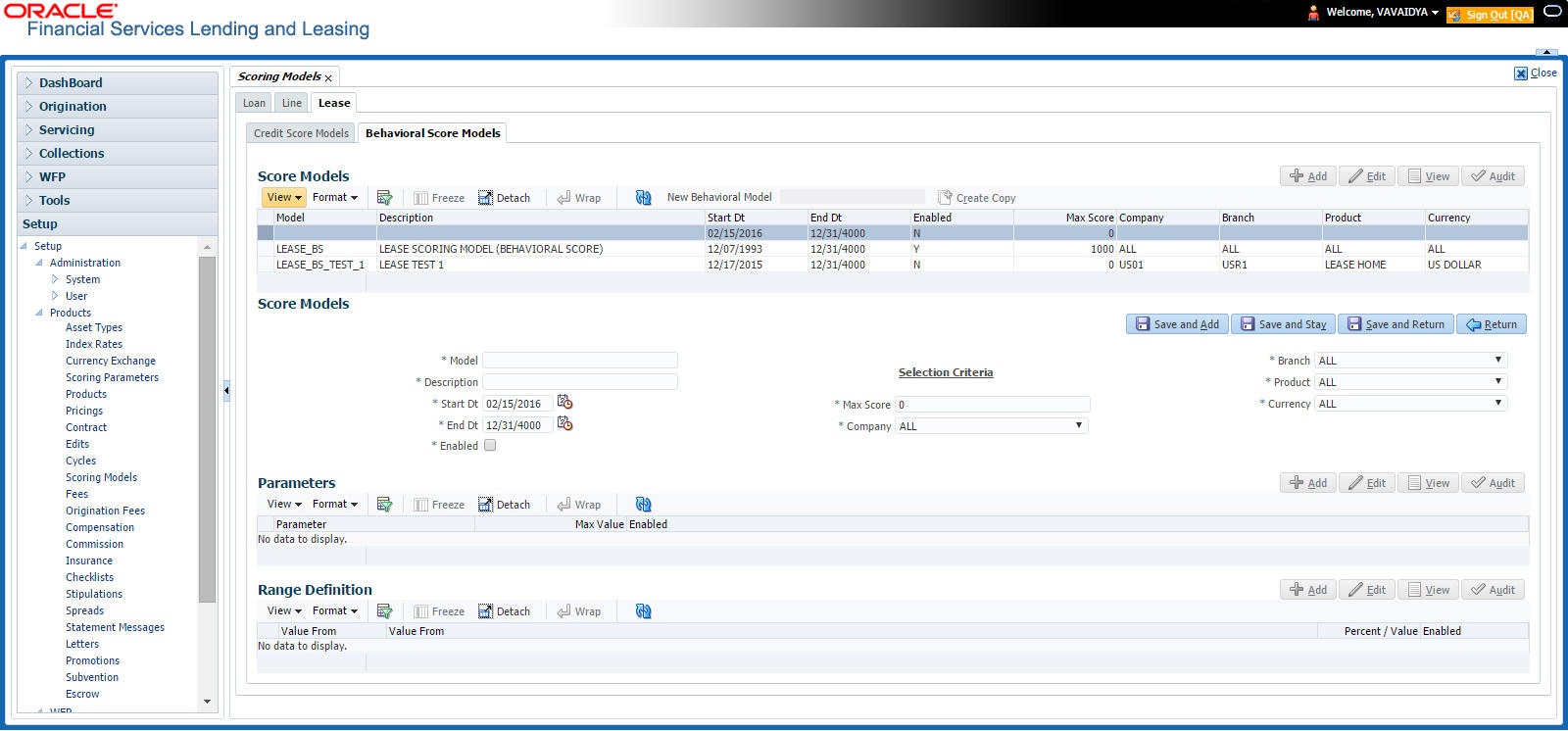4.5.1 Behavioral Score Models
- Click Setup > Setup > Administration > User > Products > Scoring Models > Lease > Behavioral Score Models.
- In the Score Models section, perform any of the Basic Operations mentioned in Navigation chapter.
Figure 4-5 Behavioral Score Models
 A brief description of the fields is given below:
A brief description of the fields is given below:Table 4-20 Behavioral Score Models
Field Do this Model Specify the code for the scoring model. Description Specify a description of the scoring model. Result section Max Score Specify the maximum score allowed. (This is normally the sum of the Max Value fields within the scoring parameters.). Selection Criteria section Company Select the company for the scoring model, from the drop-down list. This may be ALL or a specific company. Branch Select branch within the company for the scoring model, from the drop-down list. (This may be ALL or a specific branch. However, if you have selected ALL in Company field, then you must select ALL for this field). Product Select the product for the scoring model, from the drop-down list. This may be ALL or a specific product. Currency Select the currency for the scoring model, from the drop-down list. This may be ALL or a specific currency. Bureau Score Reasons Check this box if bureau score reason is applicable. Auto Decision Check this box if auto decision is applicable. Start Dt Specify the start date for the scoring model. You can even select the date from the adjoining Calendar icon. End Dt Specify the end date for the scoring model. You can even select the date from the adjoining Calendar icon. Enabled Check this box to enable the scoring model. Result section Max Score Specify the maximum score allowed. (This is normally the sum of the Max Value fields within the scoring parameters.). Selection Criteria section Company Select the company for the scoring model, from the drop-down list. This may be ALL or a specific company. Branch Select branch within the company for the scoring model, from the drop-down list. (This may be ALL or a specific branch. However, if you have selected ALL in Company field, then you must select ALL for this field). Product Select the product for the scoring model, from the drop-down list. This may be ALL or a specific product. Currency Select the currency for the scoring model, from the drop-down list. This may be ALL or a specific currency. Bureau Score Reasons Check this box if bureau score reason is applicable. Auto Decision Check this box if auto decision is applicable. - Perform any of the Basic Actions mentioned in Navigation chapter.
- Click Create Copy button on the Score Models screen to create copy of the selected record with details.
The Parameters section records the parameters used to determine the score calculated by the scoring model. You can define multiple parameters and adverse action reason associated with each parameter in a scoring model. Each scoring parameter can have maximum values set. The score range is based upon the information in the Range Definition section on the Parameters sub tab.
The system calculates a final score by adding the score for each parameter in the scoring model. A parameter weighted value is used to find the four adverse action reasons, if bureau reasons are not used.Note:
- A character parameter range definition should contain the exact value of the parameter.
- Each scoring parameter should have range definitions defined that encompass all of the values that might result.
- In the Parameters section, perform any of the Basic Operations mentioned in Navigation chapter.
A brief description of the fields is given below:
Table 4-21 Parameters
Field Do this Parameter Select the parameter from the field, from the drop-down list. Max Value Specify the maximum value allowed for the selected parameter. Adverse Action Reason Select the adverse action reason. Weighted Value Specify the weighted value. Enabled Check this box to enable the parameter. - Perform any of the Basic Actions mentioned in Navigation chapter.
- The Range Definition section allows you to translate the calculated value for a scoring parameter into the value to be used, depending on the returned value of the parameter.
- In the Range Definition section, perform any of the Basic Operations mentioned in Navigation chapter.
A brief description of the fields is given below:
Table 4-22 Range Definition
Field Do this Value From Specify the lowest calculated value to apply the specific translation. The ceiling of the range definition is based on the range definition with the next highest Value From or the Max Value of the scoring parameter (whichever is less). Value From Select the following options to determine how values for a scoring parameters are translated:
% Max Value – If selected, then the calculated values within the range definition receives a value based on a percentage of the Max Value of the scoring parameter.
% Param – If selected, then the calculated values within the range definition receives a value based on a percentage of the calculated value of the scoring parameter.
Value – If selected, then the calculated values with in the range definition receives a specific value.
Percent / Value Specify the percent or value to be used in the translation of the calculated value of the scoring parameter. Enabled Check this box to consider this range definition while translating values for this scoring parameter. - Perform any of the Basic Actions mentioned in Navigation chapter.
Parent topic: Scoring Models